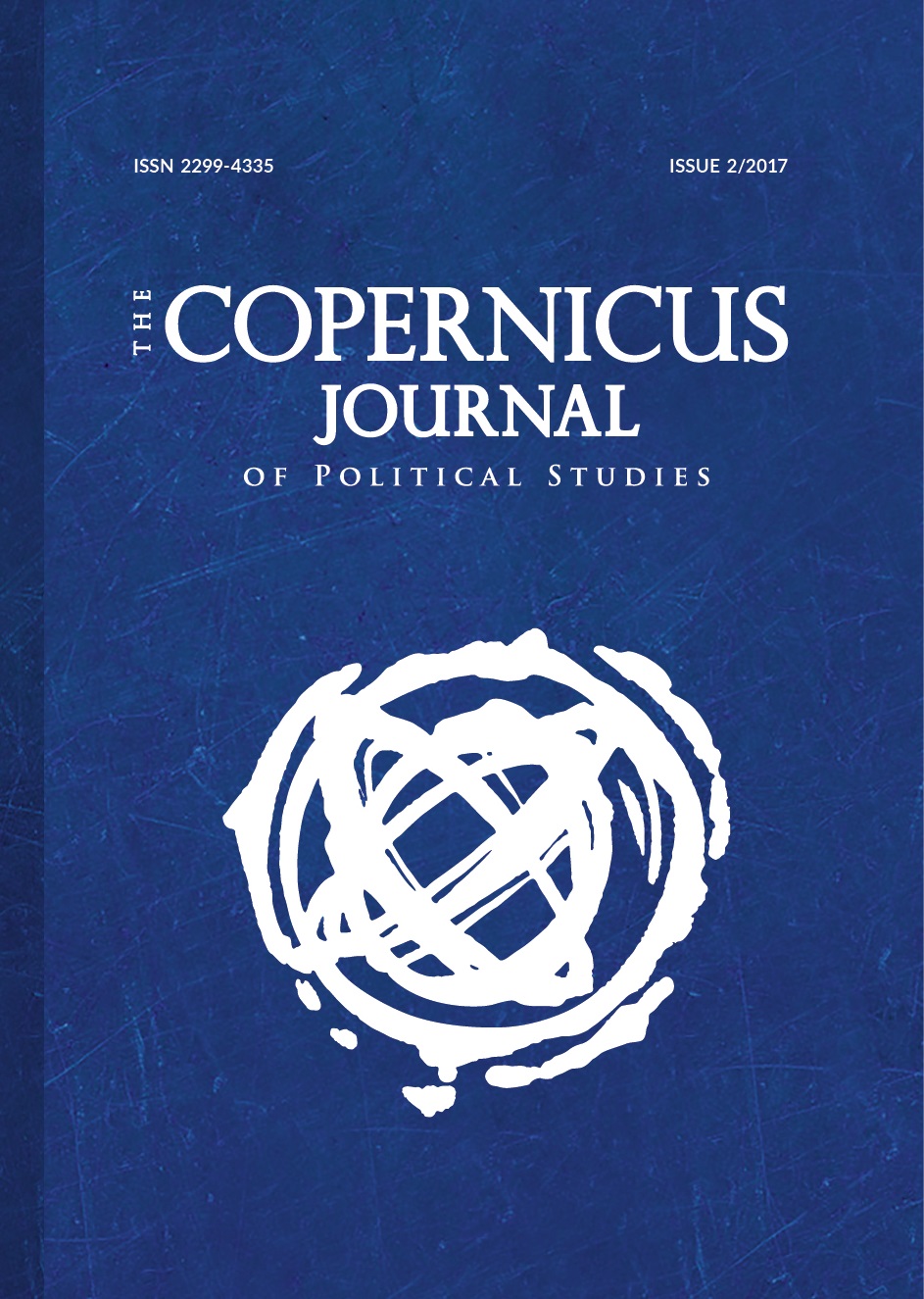TURKEY’S NEW FOREIGN POLICY: THE QUEST FOR REGIONAL HEGEMONY IN THE MIDDLE EAST?
DOI:
https://doi.org/10.12775/CJPS.2017.009Słowa kluczowe
strategic depth, zero-problem policy, Turkish diplomacy, Turkish minoritiesAbstrakt
The last decades saw Turkey evolving from its Cold War era model of foreign relations, when it was the bastion of the West in the region, which involved alliance with the US and Israel. Following the doctrine of Ahmed Davutoĝlu, a theoretician of the Islamic Justice and Development Party (AKP), which rose to power in 2002, Turkey opened to the neighbouring states, striving to become a regional power by diplomatic rather than military means and through cultural and economic incentives. Both the internal and international actions of AKP governments were initially successful, and Turkey with its version of Islamic democracy was considered a model during the Arab Spring and a sound counterbalance to such countries as Iran. However, Turkey’s bid to join the EU was stalled, and its approach to the civil war in Syria as well as other issues has been heavily criticized both in the West and in the region. The internal tensions are growing too, as the government has failed to recognize the rights of large minority groups, particularly the Kurds and the Alevi, which may threaten the integrity of the country.
Bibliografia
Abramowitz, M. & Barkey, H. J. (2009). Turkey’s Transformers. The AKP Sees Big. Foreign Affairs 88(6), 118-128
Barkey, H. J. (2004, September 8). Geopolitics. Turkey´s chill further isolates Israel. Los Angeles Times
Barkey, H. J. (2003). The Endless Pursuit: Improving US-Turkish Relations. In M. Abramowitz (ed.): The United States and Turkey: Allies in Need. Washington, DC: Century Foundation.
Boot, M. (2004, September 9). Bush can´t afford inaction on Iran. Los Angeles Times. Retrieved on July 12, 2013 from http://articles.latimes.com/2004/sep/09/opinion/oe-boot9
Brzezinski, Z. (1997). Die einzige Weltmacht. Amerikas Strategie der Vorherrschaft. Berlin: Fischer.
Bumiller, E. & Hauser, C. (2004, June 28). Bush courts Turks and presses NATO. International Herald Tribune 1,4.
Burns,. N. R. (2012, April 27). The Rise of Turkey as a Superpower. Boston Globe. Retrieved on July 12, 2013 from https://www.bostonglobe.com/opinion/2012/04/26/rise-turkey-superpower-rise-turkey-superpower/pH10xEfUrj19OcLDVJmJZJ/story.html
Cagaptay, S. (2009, October 26). Is Turkey Leaving the West? An Islamist Foreign Policy Puts Ankara at Odds With Its Former Allies. Foreign Affairs. Retrieved on July 12, 2013 from https://www.foreignaffairs.com/articles/turkey/2009-10-26/turkey-leaving-west
Cagaptay, S. & Khanna, P. (2013, September 13). Middle East Reconfigured: Turkey vs. Iran vs. Saudi Arabia. The Washington Institute for Near East Policy. Retrieved on September 22, 2013 from https://edition.cnn.com/2013/09/13/opinion/khanna-cagaptay-turkey-iran-saudi-arabia/
Champion, M. & Spiegel, P. (2010, June 10). Gates Says EU Pushed Turkey Away. U.S. Defense Secretary Blames Bloc's Resistance to Granting Membership for Ankara's Turn from Israel and the West. Wall Street Journal.
Cook, S. A.: Overdone Turkey. The hype about Ankara as a regional leader is way overblown. Foreign Policy, November 21, 2012. https://foreignpolicy.com/2012/11/21/overdone-turkey/
Davutoĝlu, A. (2011). Stratejik Derinlik. Türkiye’nin Uluslararası Konumu. 74. edn. Istanbul: Küre Yayınları.
Erdogan bekräftigt EU-Kurs der Türkei. (2007, September 1). Neue Zürcher Zeitung.
Final Report of the European Council at Helsinki (1999). Retrieved on September 23, 2013 from http://europa.eu.int/
Frei, D. (1985). Integrationsprozess, in: W. Weidenfeld (Ed.): Die Identität Europas. Bonn: Bundeszentrale für politische Bildung.
Fuller, G. (2007). The New Turkish Republic: Turkey as a Pivotal State in the Muslim World. Washington DC: United States Institute of Peace Press.
Gwertzman, B. & Larrabee, F. S. (2010, June 3). Managing a More Assertive Turkey. Interview at CFR.
Huntingdon, S. P. (1998). The Clash of Civilizations and the Remaking of World Order. London: Simon & Schuster.
Janning, J. (2002). Europa von der "Zivilmacht" zur militärischen Reaktionsfähigkeit. In M. A. Ferdowsi, Sicherheit und Frieden zu Beginn des 21.Jhdts. Konzeptionen-Akteure-Regionen. Munich: Bayerische Landeszentrale für Politische Bildungsarbeit.
Larrabee, F. S. (2007). Turkey Rediscovers the Middle East. Foreign Affairs 86(4), 103- 114.
Lynch, A., Legro, J. et al. (2011). Domestic Influences, Comments, and Discussion. In W. B. Quandt (ed.), Troubled Triangle. The United States, Turkey, and Israel in the New Middle East. Charlottesville, Va: Just World Publishing.
Mead, W. R. (2010). Terrible Twins: Turkey, Brazil and the Future of American Foreign Policy. The American Interest. Retrieved on September 23, 2013 from https://www.the-american-interest.com/2010/06/05/terrible-twins-turkey-brazil-and-the-future-of-american-foreign-policy/.
Mousseau, Demet Yalcin.(2006) The Impact of the European Union on Democracy in Turkey and Its Implications for the Region. Paper, presented at the Brookings Institution and Sabanci University in May 2006.
Norland, R., Sebnem, A. & Cowell, A. (2012, June 25). Defections and Downed Turkish Jet Worsen Syria Crisis. New York Times. Retrieved on July 14, 2013 from https://www.nytimes.com/2012/06/26/world/middleeast/syrian-military-defections-reported.html
Örmeci, O. (2010, May 29). Turkey's Role in the Organization of Islamic Conference, JDP Government and the Greater Middle East Project. Caspian Weekly com. Retrieved on July 14, 2013 from http://www.academia.edu/363428/_%C3%96rmeci_Ozan_2010_Turkeys_Role_in_the_Organization_of_Islamic_Conference_JDP_Government_and_the_Greater_Middle_East_Project_Caspian_Weekly
Özel, S. (2011). Reshuffling the Cards: Turkey, Israel, and the United States in the Middle East. In W. B. Quandt (ed.), Troubled Triangle. The United States, Turkey, and Israel in the New Middle East. Charlottesville, Va: Just World Publishing.
Park, B. (2011). Turkey and the US. A Transatlantic Future? In A. M. Dorman & J. P. Kaufman (eds.), The Future of Transatlantic Relations. Perceptions, Policy and Practice. Stanford: Stanford University Press.
Phillips, D. L. (2004). Turkey's Dreams of Accession. Foreign Affairs. Retrieved on 22 July 2013 from https://www.foreignaffairs.com/articles/europe/2004-09-01/turkeys-dreams-accession
Pollock, D. & Cagaptay, S. (2013, January 7). What Happened to the ‘Turkish Model’? Fikra Forum. Retrieved on 21 September 2013 from http://fikraforum.org/?p=2967
Steinbach, U. (1992). Kemalismus oder Fundamentalismus. Die modellpolitische Konkurrenz zwischen der Türkei und dem Iran und die Zukunft der islamischen Welt. Blätter für deutsche und internationale Politik 37(7), 817-829.
Walker, J. W. (2011). A FELLOW’S VIEW: Inshallah, A Middle East Like Turkey Not Iran. In Belfer Center Newsletter, Belfer Center for Science and International Affairs, Harvard Kennedy School. Summer 2011.
Wandel in der türkischen Aussen- und Sicherheitspolitik. Ankara zwischen den Vereinigten Staaten, der Europäischen Union und dem Mittleren Osten. (2006, October 6). Neue Zürcher Zeitung Retrieved on 23 September 2013 from https://www.nzz.ch/articleehtsr-1.66195
Weidenfeld, W. (2010). Die Europäische Union. Paderborn 2010.
Pobrania
Opublikowane
Jak cytować
Numer
Dział
Statystyki
Liczba wyświetleń i pobrań: 766
Liczba cytowań: 0



